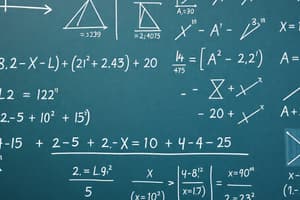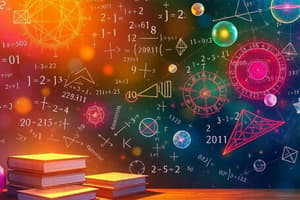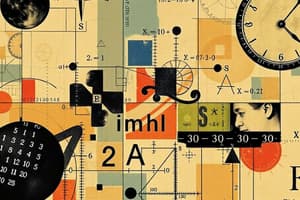Podcast
Questions and Answers
What is the role of set theory in mathematics?
What is the role of set theory in mathematics?
- It serves as a method to solve algebraic equations.
- It is primarily concerned with prime numbers.
- It forms the foundation for various mathematical concepts. (correct)
- It focuses exclusively on the study of functions.
Which of the following correctly defines complex numbers?
Which of the following correctly defines complex numbers?
- Numbers that consist of only rational components.
- Numbers that can only be positive.
- Numbers that are always whole and non-negative.
- Numbers that include an imaginary component. (correct)
What is a key property of functions?
What is a key property of functions?
- They can only have one variable.
- They must always be linear.
- They describe relationships between sets of input and output values. (correct)
- They are only applicable in calculus.
In which fields is mathematics essential for modeling and analysis?
In which fields is mathematics essential for modeling and analysis?
Which of the following does NOT belong to the different types of number systems?
Which of the following does NOT belong to the different types of number systems?
What are the basic operations in arithmetic?
What are the basic operations in arithmetic?
Which concept is NOT a focus of algebra?
Which concept is NOT a focus of algebra?
What key aspect distinguishes calculus from other branches of mathematics?
What key aspect distinguishes calculus from other branches of mathematics?
Which of the following is NOT a measure of central tendency in statistics?
Which of the following is NOT a measure of central tendency in statistics?
Which term refers to the rigorous arguments used to establish mathematical truth?
Which term refers to the rigorous arguments used to establish mathematical truth?
Which branch of mathematics deals primarily with the properties of shapes and space?
Which branch of mathematics deals primarily with the properties of shapes and space?
What does differential calculus primarily focus on?
What does differential calculus primarily focus on?
What does the concept of commutativity refer to in arithmetic?
What does the concept of commutativity refer to in arithmetic?
Flashcards
Set
Set
A collection of objects, often denoted by curly braces { }.
Subset
Subset
A set where all its elements are also members of another set.
Intersection of sets (A ∩ B)
Intersection of sets (A ∩ B)
The set of elements that are in both sets A and B.
Union of sets (A ∪ B)
Union of sets (A ∪ B)
Signup and view all the flashcards
Complement of a set (A')
Complement of a set (A')
Signup and view all the flashcards
What is mathematics?
What is mathematics?
Signup and view all the flashcards
What is arithmetic?
What is arithmetic?
Signup and view all the flashcards
What is algebra?
What is algebra?
Signup and view all the flashcards
What is geometry?
What is geometry?
Signup and view all the flashcards
What is calculus?
What is calculus?
Signup and view all the flashcards
What is statistics?
What is statistics?
Signup and view all the flashcards
What is a mathematical proof?
What is a mathematical proof?
Signup and view all the flashcards
What is logic?
What is logic?
Signup and view all the flashcards
Study Notes
Fundamental Concepts
- Mathematics is the study of quantity, structure, space, and change.
- It involves the use of logic and abstract reasoning to develop theories.
- Key branches include arithmetic, algebra, geometry, calculus, and statistics.
- Mathematics plays a vital role in various fields, including science, engineering, and computer science.
Arithmetic
- Arithmetic deals with basic operations: addition, subtraction, multiplication, and division.
- It forms the foundation for more advanced mathematical concepts.
- Includes concepts like factors, multiples, prime numbers, and divisibility rules.
- Properties like commutativity, associativity, and distributivity are central to arithmetic operations.
Algebra
- Algebra uses symbols to represent unknowns and variables.
- It involves manipulating equations and formulas to solve problems.
- Includes concepts like linear equations, quadratic equations, and systems of equations.
- Focuses on generalizing arithmetic operations and patterns.
- Introduces the concept of variables and expressions.
Geometry
- Geometry studies shapes, sizes, positions, and properties of objects in space.
- Includes concepts like points, lines, angles, triangles, polygons, circles, and 3D shapes.
- Deals with measurement of length, area, and volume.
- Applies principles of reasoning and deduction to solve geometric problems.
- Different types of geometries exist (e.g., Euclidean, non-Euclidean).
Calculus
- Calculus deals with continuous change.
- Includes differential calculus (rates of change) and integral calculus (accumulation of change).
- Applies to problems involving motion, growth, and optimization.
- Used in fields like physics, engineering, and economics.
- Concepts such as derivatives, integrals, limits, and series are central.
Statistics
- Statistics involves collecting, analyzing, interpreting, and presenting data.
- Useful for drawing conclusions and making predictions based on data.
- Includes concepts like measures of central tendency (mean, median, mode), measures of dispersion (variance, standard deviation), and probability.
- Essential for data analysis and informed decision-making.
- Techniques like hypothesis testing and regression analysis are core components.
Logic and Proof
- Mathematics relies heavily on logic and proof.
- Deductive reasoning is used to establish theorems and results.
- Mathematical proofs are rigorous arguments showing truth of a statement.
- Formally constructed arguments to demonstrate validity.
Set Theory
- Set theory forms a foundation for many mathematical concepts.
- Deals with collections of objects, called sets.
- Concepts in set theory include subsets, intersections, unions, complements.
- Used across different mathematical disciplines.
Number Systems
- Different number systems (natural numbers, integers, rational numbers, irrational numbers, real numbers, complex numbers) exist.
- Each system has specific properties.
- The real numbers include all rational and irrational numbers.
- Complex numbers have imaginary components.
- Understanding these systems allows working with a wider range of quantities.
Functions
- Functions describe relationships between sets of input and output values represented by variables.
- Properties like domain, range, and types of functions are essential.
- Different types of functions (linear, quadratic, exponential, trigonometric) exist.
- Key element in mathematical modeling and analysis.
Applications of Math
- Used to model and analyze a wide range of phenomena.
- Essential in physics, engineering, computer science, economics, and other fields.
- Provides powerful tools for making predictions and solving problems.
Studying That Suits You
Use AI to generate personalized quizzes and flashcards to suit your learning preferences.




